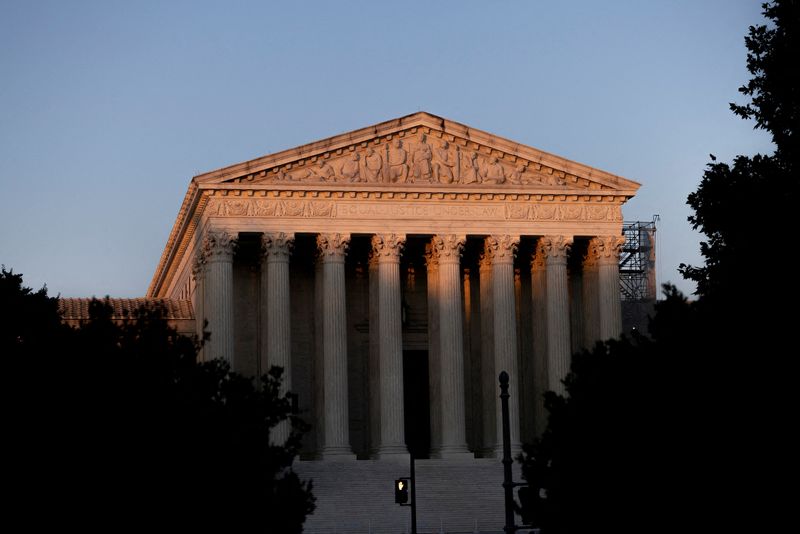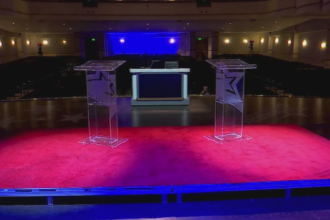By John Kruzel and Andrew Chung
WASHINGTON (Reuters) -Conservative U.S. Supreme Court justices signaled their willingness on Wednesday during arguments in a case involving Louisiana electoral districts to undercut a key section of the Voting Rights Act, the landmark 1965 federal law enacted by Congress to prevent racial discrimination in voting.
A group of Black voters has appealed a lower court’s finding that a voting map that added a second Black-majority congressional district in Louisiana was guided too much by racial considerations in violation of the constitutional promise of equal protection under the law.
Louisiana, where Black people make up roughly a third of the population, has six U.S. House of Representatives districts. Black voters tend to support Democratic candidates.
The arguments were ongoing.
The Supreme Court has a 6-3 conservative majority. The case gives the conservative justices a chance to undercut a central element of the Voting Rights Act. The law’s Section 2 prohibits electoral maps that would result in diluting the clout of minority voters, even without direct proof of racist intent.
This provision gained greater significance as a bulwark against racial discrimination in voting after the Supreme Court, in a 2013 ruling authored by conservative Chief Justice John Roberts, gutted a different part of the same law.
Questions posed by some of the conservative justices during the arguments expressed concern about the application of this Voting Rights Act provision in this case to create a second Black-majority district.
“This court’s cases, in a variety of contexts, have said that race-based remedies are permissible for a period of time, sometimes for a long period of time – decades, in some cases – but that they should not be indefinite and should have an end point,” Justice Brett Kavanaugh told Janai Nelson, president of the NAACP Legal Defense Fund who was arguing on behalf of a group of Black voters.
Nelson told the justices that it would reckless to determine that Section 2 somehow is no longer needed simply because it has been so successful in combating discrimination.
The electoral map initially drawn by Louisiana’s Republican-controlled legislature, Nelson told the justices, had diluted Black voting power in favor of a map that would give the state’s white electorate “entrenched control.”
Nelson said that the legislature’s subsequent creation, following a judge’s ruling that the map with just one Black-majority congressional district likely harmed Black voters in violation of Section 2, of a second such district to remedy that discrimination and to ensure that Black Louisianans have an equal opportunity to participate in the process is constitutional. Nelson said this view was supported by a long line of earlier voting rights decisions from the Supreme Court.
Republicans currently hold a slim majority in the U.S. House. A decision invalidating Section 2 could allow Republicans to reconfigure as many as 19 House districts, according to a report by Democratic-affiliated advocacy groups Fair Fight Action and Black Voters Matter Fund.
REDISTRICTING PROCESS
In a process called redistricting, the boundaries of legislative districts across the United States are reconfigured every decade to reflect population changes as measured by the national census. Redistricting typically is carried out by state legislatures.
Conservative Justice Samuel Alito questioned Nelson about the degree to which state lawmakers are allowed to draw maps to favor their own political parties and protect politicians already in office, known in the U.S. system as incumbents.
Under the Supreme Court’s precedents, Alito asked, “isn’t seeking partisan advantage also an objective that a legislature may legitimately seek?” Nelson said that is not true if the partisan line-drawing “comes at the cost of the equal protection principle.”
After Louisiana’s Republican-controlled legislature adopted a map that included just one Black-majority district following the 2020 census, a group of Black Louisiana voters sued. A federal judge ruled in favor of the plaintiffs, deciding that the map likely harmed Black voters in violation of Section 2.
The state legislature responded by drawing a new map that added a second Black-majority district. This map prompted a separate lawsuit by 12 Louisiana voters who described themselves in court papers as “non-African American.” They argued that the second Black-majority district unlawfully reduced the influence of non-Black voters like them. White people make up a majority of Louisiana’s population.
The redrawn map relied too heavily on race in violation of the equal protection principle, a three-judge panel found in a 2-1 ruling, prompting the appeal to the Supreme Court.
Liberal Justice Elena Kagan tried to focus the arguments on the real-world impact of a decision gutting Section 2. Kagan asked Nelson: “Were Section 2 to cease to operate, in the way that you just described, to prevent vote dilution in districting, what could happen? What would the results on the ground be?”
“I think the results would be pretty catastrophic,” Nelson said.
The United States has racial diversity in political leadership “because of litigation that forced the creation” of Black-majority districts, Nelson said.
“If it happens to be that people of one race or another race overwhelmingly prefer one of the political parties, does that transform the situation into racial voting? Or is it still just partisan voting?” Alito asked Nelson.
“The fact that Black voters may correlate with voting Democrat or white voters may correlate with voting Republican does not deny the fact that there is racially polarized voting,” Nelson told the justices.
Nelson said the fact that no Black candidate had ever been elected to a statewide office is an additional indication that “race is playing an outsized role in the electoral process in Louisiana.”
The Supreme Court heard arguments for the second time this year in the case. It also did so in March but then in June sidestepped a decision and ordered another round of arguments.
The state initially had appealed the three-judge panel’s ruling and argued in March on the same side as the Black voters. But it has now changed its stance and is urging the justices to forbid race-conscious map-drawing altogether.
Republican President Donald Trump’s administration supports the challenge to the Voting Rights Act on separate legal grounds.
The Supreme Court has rolled back protections under the Voting Rights Act. Its 2013 ruling in a case involving Alabama’s Shelby County gutted a Voting Rights Act provision that had required states and locales with a history of racial discrimination to get federal approval to change voting laws.
The court, however, ruled 5-4 in 2023 that a Republican-drawn electoral map in Alabama violated Section 2, siding with Black voters who had challenged the map and had sought an additional Black-majority congressional district. Roberts and Kavanaugh joined the court’s three liberals to form a majority.
The Supreme Court is expected to rule by the end of June.
(Reporting by John Kruzel, Andrew Chung and Jan Wolfe; Editing by Will Dunham)









